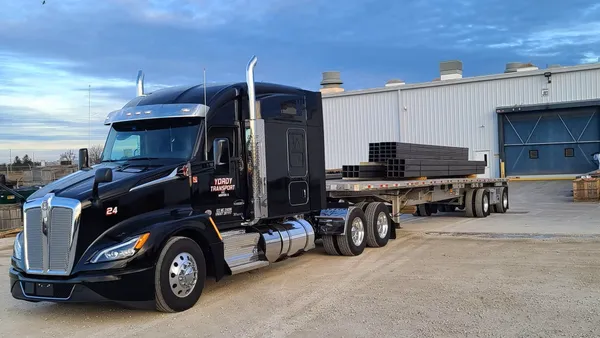Dive Brief:
- Severe weather in Asia and the Eastern U.S. slowed seasonal freight flows in October, according to the DAT Freight Index, several media outlets reported.
- An expected October rebound in freight volumes was interrupted by Hurricanes Florence and Michael, as well has Typhoon Mangkhut in Asia.
- October volume was 7% lower month-over-month and 33% below 2017 levels, DAT reported.
Dive Insight:
"Some of that demand has shifted into early November, with imported goods moving from seaports to regional distribution centers across the country," DAT analyst Peggy Dorf said in the press release. Truckload freight rates also slipped for all equipment types compared to September, however rates remain well above 2017 levels, due partly to an increase in fuel surcharges to compensate for rising diesel prices.
It’s really no surprise that freight took a hit. Hurricanes Florence and Michael were devastating in different ways.
Florence, for example, moved slowly through the Carolinas in September as a Category 1 hurricane triggering record flooding. Michael didn’t drop as much rain, but remained at least a Category 3 hurricane in southwest Georgia. (It began as a Category 4 and may be reclassified as a 5 once all data has been analyzed, Mike Brennan, chief of the hurricane specialist unit at the National Hurricane Center, told the Washington Post.)
Typhoon Mangkhut, meanwhile, struck the Philippines, Hong Kong and mainland China: all important areas for freight import and export. Transport services were suspended, flights canceled, trains stopped and major roads closed in Hong Kong where winds reached more than 110mph and water levels surged to 12 feet in some places.
Hurricanes happen every year, so how do supply chains react? In August, as this year’s hurricanes were gathering steam, Supply Chain Dive reported that planning and communications are key to getting through. Some, however, aren’t ready.
Jon Slangerup, Chairman and CEO at American Global Logistics told Supply Chain Dive that those in harm’s way usually have a diversion strategy in place, however, “there also are some with very little knowledge of their supply chain.”
FM Global, a commercial and industrial property insurer surveyed 101 senior financial executives at Fortune 1000 organizations just after hurricane season last year. In the report, 64% of the respondents said the hurricane season had an adverse impact on their business, and among those impacted, 62% were not completely prepared to deal with the effects.












